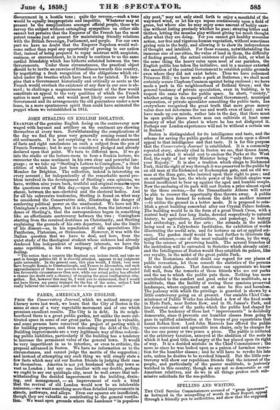JOHN STEALING ON ENGLISH ISOLATION. EXAMPLES of the genuine English
feeing on the controversy now waged with bayonet and artillery on the continent are showing themselves at every turn. Notwithstanding the complications of the day we find the press very generally coming round to the
i old sentiments. It not surprising to see a distinct statement
of facts and. right conclusions on such a subject from the pen of Francis Newman ; but he may be considered pledged and already declared upon that point. We turn to different men. If we go into the studio or the lecture-room to hear a Ruskin lecture, we encounter the same sentiment in his own clear and powerful lan- guage; or we take up "Sterling's Letters to Coningham " a third edition of which has just been opportunely published by the Member for Brighton. The collection, indeed is interesting on every account ; for independently of the remarkable moral pro- blem involved in the development of Sterling's own opinions, we have, written nine years back, truthful and original remarks upon the questions even of this day,—upon the controversy, for in- stance, between the non-electoral and the electoral bodies. And for all his subversive tendencies, Sterling is found on what may be considered the Conservative side illustrating the danger of conferring political power on the uneducated. We have not Mr. Coningham's own letters, but it is evident, from the internal evi- dence of Sterling's, that the correspondence began in something like an affectionate controversy between the two; Coningham starting from the received doctrines on Christianity, and Sterling explaining the grounds of his own departure, but also the limits of his dissent—as, in his repudiation of idle speculations like Pantheism, Platonism, or Straussism. However' it was with the Italian question that we have to deal, and here, from the quiet study of the theological student whose sickness had already rendered him independent of ordinary interests, we have the same repetition, in his own language, of the genuine English feeling.. "The notion that a country like England can isolate itself, and take no part in foreign politics till it is directly attacked, appears to my judgment quite untenable. In the present case, this plan would, I think, very soon have brought Russia to Constantinople, and France to Alexandria, and such aggrandisement of these two powers would have forced us into war under less favourable circumstances than now, while our actual policy has afforded a chance (no doubt only a chance,) of escaping the great conflagration alto- gether. But, however this may be, I wish you to understand, that I would not have blown my penny trumpet for the fun of the noise, unless I had really believed the occasion a just one for so desperate a measure."


























 Previous page
Previous page